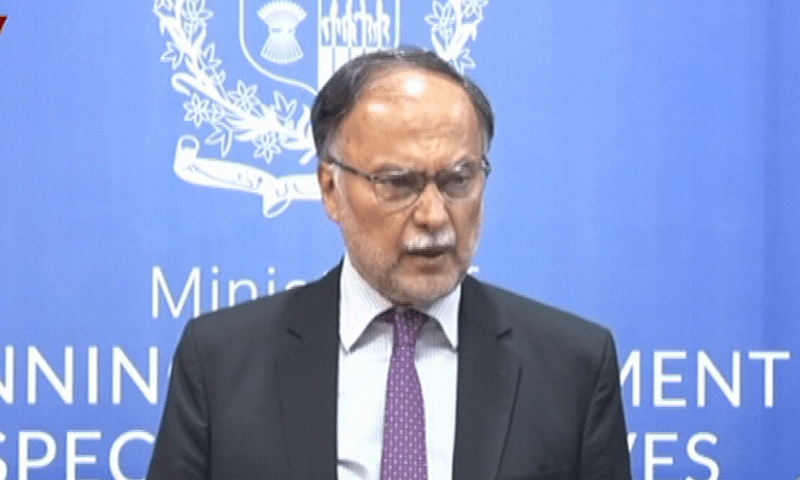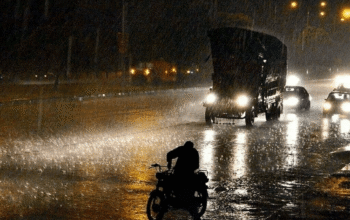By Staff Reporter
ISLAMABAD: The National Economic Council (NEC) on Tuesday approved an energy conservation plan that will require shops and commercial centers to close by 8pm starting from July 1.
The decision was made during a meeting of the NEC, which was chaired by Prime Minister Shehbaz Sharif. Representatives from all provinces were present at the meeting.
“After assessing the prevailing situation, it was unanimously decided to close all shops from 8pm starting from July 1,” Planning and Development Minister Ahsan Iqbal told a news conference in Islamabad. “There is a consensus among all provinces to implement this decision, demonstrating their collective commitment to energy conservation.”
The minister said the government’s highest expenses are incurred on energy. “Measures are being taken to control these expenses, and if we manage to control them, many issues will be resolved.”
Minister Iqbal recalled the cabinet’s commitment to enforce decisions under the National Energy Conservation Plan in January this year but noted the absence of provincial governments’ representation in that meeting hampered the plan.
Consequently, the matter was revisited in the NEC, which included provincial government representatives, resulting in the approval of the energy conservation package.
Minister Iqbal said the measures would also help to mitigate the economic risks associated with rising global oil prices after Saudi Arabia’s recent decision to cut down oil production by one million barrels that could push oil prices above $100 per barrel.
“We cannot afford to continue our irresponsible lifestyle of keeping commercial areas open until late hours,” Iqbal said. “We need to adopt a more sustainable and efficient approach to energy consumption.”
Minister Iqbal said the adoption of these energy conservation measures, including the early closure of shops, switching to LED lights, and upgrading geysers for enhanced energy efficiency, could potentially save the country up to $1 billion annually.
“Even wealthy nations in Europe and the United States do not keep commercial areas open until late hours,” Iqbal said. “Pakistan’s current practice of shops remaining open until 1am or 2am reflects an irresponsible lifestyle.”
Traders reject decision
Meanwhile, the traders have rejected the decision of the government.
The All-Pakistan Traders Association has responded to the government’s decision, demanding the withdrawal of the decision to close shops at 8 pm.
Jamil Baloch, association president, said: “No shops will be closed at 8 pm this summer”. “Every government has failed in the unsuccessful practice of closing shops at 8pm. In the summer season, no purchases are made during the day; buying only occurs from 8 pm to 11 pm.”
Baloch said that traders are the ones who purchase the most expensive electricity in the country.
“It is absurd to stop the economic wheel to save energy. The government should cease the supply of free electricity and the rulers should turn off their air conditioners.”
Budget details
The minister said the NEC has approved an estimated 3.5 percent GDP growth target and 21 percent inflation projection during its 2023-24 financial year. Development spending will be Rs1,150 billion.
The estimated numbers were shared in the meeting ahead of the budget announcement on Friday.
“We’re taking those choices which take the country toward stability,” he added.
Iqbal also pointed out the dismal condition of the economy, saying the government would not be able to pay off debt fully through federal revenue.
“This is a defining moment of where we’ve reached,” he said. “(The country) will need to borrow for the rest of budget that includes salaries for the government, defense budget, development budget, pension, subsidies.”
The total outlay of the budget, or total spending, is expected to be Rs14.5 trillion. The budget proposals also included a fiscal deficit target of 7.7 percent of GDP and a revenue collection target of Rs9.2 trillion.
For the outgoing fiscal year 2022-23, which ends on June 30, the country’s GDP growth fell to 0.29 percent against last year’s annual budget target of 5 percent, and a revised projection of 2 percent by the central bank.
Inflation posted at 38 percent in May is the highest in Asia.
Copyright © 2021 Independent Pakistan | All rights reserved




